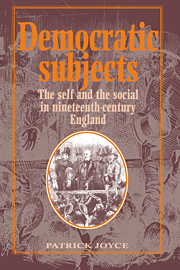Book contents
- Frontmatter
- Contents
- List of plates
- Acknowledgements
- Introduction
- Part One The sorrows of Edwin Waugh: a study in ‘working-class’ identity
- Part Two John Bright and the English people: a study in ‘middle-class’ identity
- Part Three Democratic romances: narrative as collective identity in nineteenth-century England
- 12 Narrative and history
- 13 The romance of improvement
- 14 The aesthetic framing of the social
- 15 The constitution as an English Eden
- 16 The story of the cruel Turk
- 17 Some democratic leading men, or Mr Gladstone's dream
- Appendices
- Index
13 - The romance of improvement
Published online by Cambridge University Press: 10 December 2009
- Frontmatter
- Contents
- List of plates
- Acknowledgements
- Introduction
- Part One The sorrows of Edwin Waugh: a study in ‘working-class’ identity
- Part Two John Bright and the English people: a study in ‘middle-class’ identity
- Part Three Democratic romances: narrative as collective identity in nineteenth-century England
- 12 Narrative and history
- 13 The romance of improvement
- 14 The aesthetic framing of the social
- 15 The constitution as an English Eden
- 16 The story of the cruel Turk
- 17 Some democratic leading men, or Mr Gladstone's dream
- Appendices
- Index
Summary
Recent research on the vocabulary of class suggests that this did not emanate chiefly from the new economic conditions and outlook of rapid industrialisation. The political context seems to have been crucial, particularly that of the period of the Napoleonic Wars (for the designation ‘middle class’) and that of the Reform agitation of the early 1830s, in which ‘middle’ and ‘working’ classes became equally prominent. Moderate opposition to war split the ranks of property, the liberal Friends of Peace, for instance, being led from the idea of a political middle to that of an economistic social middle as the putative hinge around which society was articulated. Appropriated by the Liberal opposition in the 1790s, Dror Wahrman argues that the terms of class had by the 1810s become directed against radicalism; the term ‘middle class’, for instance, becoming politically tamer, and associated less with social critique and more with political stability and conservatism. In the early 1830s all political sides sought to appropriate the notion of the ‘middle class’ for themselves. Class identities were, therefore, a product of arguments about meanings, arguments which were primarily political in character. Class does not seem to have been the collective cultural experience of new economic classes produced by the Industrial Revolution.
- Type
- Chapter
- Information
- Democratic SubjectsThe Self and the Social in Nineteenth-Century England, pp. 161 - 175Publisher: Cambridge University PressPrint publication year: 1994



